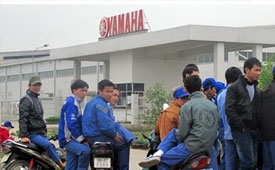FIEs’ rising strikes prompt union review
 |
| illustration photo |
The Vietnam General Confederation of Labour’s Policy and Law Division head Nguyen Duy Uy said new regulations on inspecting foreign-invested enterprises’ (FIEs) trade union organisations were to be proposed as part of amendments to the existing Trade Union Law. These amendments would be tabled at the National Assembly meeting in October.
Uy said only 30 per cent of Vietnam’s total 4,500 FIEs had trade union organisations in charge of protecting workers’ interests.
A Ministry of Labour, Invalids and Social Affairs (MoLISA) survey conducted over 1,500 local enterprises and FIEs in 2009 showed that one-third of them had no trade union organisations.
“That is why labour disputes and strikes throughout Vietnam are on the rise and are becoming more complicated and serious,” Uy said.
Since 1995, Vietnam saw more than 3,840 strikes, with 424 taking place in 2010 and over 220 in 2011’s first three months. Over 80 per cent of the strikes were at FIEs.
For example, southern Dong Nai province’s Department of Labour, Invalids and Social Affairs (DoLISA) director Le Thi My Phuong told VIR that the province witnessed over 100 strikes in 2010 and over 60 strikes since early this year.
Most of them were triggered by FIEs’ workers.
Meanwhile, northern Hai Duong province’s DoLISA reported that there had been some 20 strikes, which were all launched by FIEs workers, since early 2010.
Under Decree 96/2006/ND-CP dated September 14, 2006 on guiding the implementation of the existing Law on Labour’s Clause 153 on trade union executive committee, enterprises are required to establish their own trade union organisations as stipulated by the Labour and Trade Union laws and Vietnam trade union regulations after six months of operation, in order to protect workers’ legal interests.
However, some 70 per cent of FIEs in Vietnam had failed to obey this regulation and most of them were free from being inspected and punished due to a lack of inspectors and inspectors’ limited capacity, said Hai Duong DoLISA’s Labour and Salary Division.
The MoLISA’s Legislation Department vice head Mai Duc Thien said heads of trade unions were often members from an enterprise’s leadership.
“This means that when labour disputes or strikes happen, trade union organisations cannot play a good role in helping workers protect their interests,” Thien said.
Uy noted that no workers from all strikes happened in Vietnam since 1995 had resorted to their enterprises’ trade union organisations.
“Why have workers done that? It is because they have not believed in such organisations,” he said.
For example, Phuong said that only two-thirds of Dong Nai’s 960 FIEs had trade union organisations.
“Workers always think that the organisations never support them,” Phuong said.
The Vietnam General Confederation of Labour said low salaries were largely responsible for 90 per cent of strikes in Vietnam.
What the stars mean:
★ Poor ★ ★ Promising ★★★ Good ★★★★ Very good ★★★★★ Exceptional
Related Contents
Latest News
More News
- Foreign fruits flood Vietnamese market (December 09, 2025 | 13:22)
- Vietnam’s fruit and vegetable exports reach $7.8 billion in first 11 months (December 05, 2025 | 13:50)
- Vietnam shapes next-generation carbon market (November 26, 2025 | 15:33)
- PM urges Ho Chi Minh City to innovate and remain Vietnam’s economic locomotive (November 26, 2025 | 15:29)
- Experts chart Vietnam's digital finance path: high hopes, high stakes (November 14, 2025 | 10:56)
- Vietnam’s seafood imports surge 30 per cent in first 10 months (November 10, 2025 | 19:35)
- Vietnam’s durian exports hit $1 billion milestone (October 30, 2025 | 17:41)
- Beyond borders: Sunhouse and new era of Vietnamese brands on Amazon (October 28, 2025 | 10:46)
- Record-breaking trade fair set to open in Hanoi (October 15, 2025 | 15:59)
- Timber sector seeks solutions to VAT refunds (October 14, 2025 | 18:58)

 Tag:
Tag:
















 Mobile Version
Mobile Version